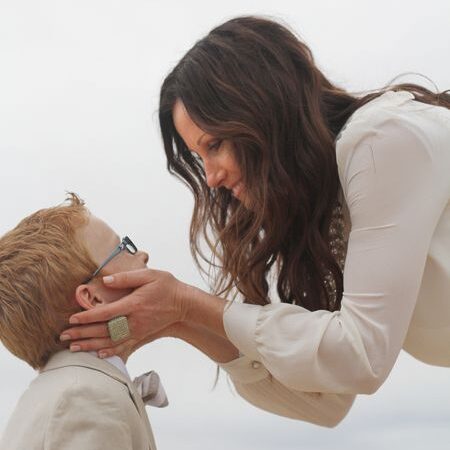9 Art of Mindful Parenting: Nurturing Connection with Your Children
Parenting is a journey that comes with its unique set of challenges and joys. As parents, we play a crucial role in shaping our children’s lives and nurturing their growth.
One approach that has gained significant attention and proven to be effective in cultivating strong bonds with our children is mindful parenting.
In this post, we will discover the 9 arts of mindful parenting and how they can help us establish a deep and meaningful connection with our children.
Busy? Save this pin for later.

1. Cultivating Presence and Awareness
Mindful parenting begins with cultivating presence and awareness in our interactions with our children. It involves being fully present in the moment, paying attention to our thoughts, emotions, and physical sensations as we engage with our children.

By being aware of our own state of mind, we can better understand and respond to our children’s needs.
Cultivating presence and awareness allows us to truly listen to our children and observe their behaviors without judgment. It helps us create a safe space for them to express themselves and feel heard.
By being present, we can also notice subtle cues that indicate their emotional state, allowing us to offer support and guidance when needed.
To cultivate presence and awareness, you can try incorporating mindfulness practices into your daily routine.
This can include activities such as meditation, deep breathing exercises, or simply taking a moment to pause and fully engage with your child during daily interactions.
By practicing these techniques regularly, you can develop a deeper connection with your child and strengthen your bond.
You Might Also Like: 50 Inspirational Life Quotes to Brighten Your Day
2. Developing Empathy and Understanding
Empathy is a fundamental aspect of mindful parenting. It involves putting ourselves in our children’s shoes and trying to understand their perspective.
By empathizing with our children, we can create a safe and nurturing environment where they feel understood and valued.

Developing empathy starts with actively listening to our children and validating their feelings. It involves acknowledging their emotions, even if we don’t necessarily agree with their perspective.
By doing so, we show them that their feelings are valid and that we are there to support them.
In addition to listening, we can also encourage open and honest communication by asking questions and showing genuine interest in their thoughts and experiences. This allows us to gain a deeper understanding of their world and helps us build a stronger connection with them.
Practicing empathy requires us to let go of preconceived notions and biases. It involves approaching each situation with an open mind and a willingness to learn from our children. By doing so, we can foster a sense of trust and create a bond based on mutual respect and understanding.
You Might Also Like: Expert Hacks for a Refreshing and Inviting Home
3. Practicing Non-Judgment
Mindful parenting encourages us to let go of judgment and accept our children as they are. It involves recognizing that each child is unique and has their own strengths, weaknesses, and challenges.
By embracing non-judgment, we can foster an environment of unconditional love and acceptance.

Practicing non-judgment means refraining from labeling our children or comparing them to others. Instead, we focus on appreciating their individuality and celebrating their accomplishments, no matter how big or small. This helps build their self-esteem and encourages them to embrace their own uniqueness.
It’s important to remember that as parents, we are not perfect either. Practicing non-judgment also means being kind and forgiving towards ourselves.
We need to accept our own imperfections and learn from our mistakes, showing our children that it’s okay to be human and make errors.
By creating a non-judgmental environment, we allow our children to feel safe and accepted for who they are. This enables them to develop a strong sense of self-worth and confidence, which is essential for their overall well-being.
You Might Also Like: Transform Your Outdoor Space with These Insider Tricks
4. Effective Communication
Clear and effective communication is essential for building a strong connection with our children. Mindful parenting emphasizes active listening, speaking with kindness, and using words that are encouraging and supportive. By communicating effectively, we can foster open and honest relationships with our children.

To communicate effectively, it’s important to practice active listening. This means giving our full attention to our children when they are speaking, without interrupting or judging. By truly listening, we show them that their thoughts and feelings are valued.
When it comes to speaking, it’s crucial to use words that are kind and supportive. Instead of criticizing or belittling, we can offer constructive feedback and encouragement.
This helps build a positive and nurturing atmosphere in which our children feel safe to express themselves.
In addition to verbal communication, non-verbal cues also play a significant role in effective communication.
Our body language, tone of voice, and facial expressions can convey messages to our children. Being aware of these cues and ensuring they align with our words can enhance our communication and strengthen our connection.
By practicing effective communication, we create an environment of trust and understanding. Our children feel comfortable sharing their thoughts and concerns with us, knowing that they will be heard and respected.
You Might Also Like: 10 DIY Home Decor Ideas That Will Transform Your Space
5. Setting Boundaries with Love
Setting boundaries is an important part of parenting, but it can be done with love and understanding.
Mindful parenting encourages us to establish clear boundaries while maintaining a compassionate and empathetic approach.
By setting boundaries with love, we can ensure our children’s safety and help them develop a sense of responsibility.

When setting boundaries, it’s important to explain the reasons behind them to our children. This helps them understand the purpose and importance of the boundaries, rather than perceiving them as arbitrary rules. By involving them in the process, we empower them to make informed choices.
Setting boundaries with love also means being consistent and following through with consequences when necessary.
It’s important to enforce the boundaries calmly and respectfully, avoiding punishment or shaming. By doing so, we show our children that boundaries are set out of love and concern for their well-being.
At the same time, it’s important to allow our children to express their opinions and negotiate within reasonable limits. This fosters a sense of autonomy and independence while still respecting the boundaries that are in place.
By setting boundaries with love, we establish a healthy balance between freedom and responsibility. Our children learn to navigate the world with a sense of safety and security, while also developing the skills necessary to make choices and take ownership of their actions.
You Might Also Like: Yoga for Beginners: Start Your Journey to Mind-Body Wellness
6. Practicing Self-Care
Taking care of ourselves is crucial for being able to nurture our connection with our children. Mindful parenting reminds us to prioritize self-care, whether it’s through practicing mindfulness techniques, engaging in activities we enjoy, or seeking support when needed.
By taking care of ourselves, we can show up as the best version of ourselves for our children.

Practicing self-care involves recognizing our own needs and making them a priority. It means setting aside time for activities that bring us joy and rejuvenate our energy.
This can include hobbies, exercise, spending time with loved ones, or simply taking a moment to relax and recharge.
In addition to individual self-care practices, it’s also important to seek support from others. This can be through connecting with other parents, joining support groups, or seeking professional help when needed.
By reaching out, we can gain valuable insights and guidance, which ultimately benefits our relationship with our children.
Practicing self-care not only benefits us as parents but also teaches our children the importance of self-love and self-preservation.
By modeling healthy self-care habits, we show them that it’s okay to prioritize their well-being and set boundaries in their own lives.
You Might Also Like: 7 Ways to Create a Welcoming and Inviting Space for Guests
7. Balancing Discipline and Freedom
Finding the right balance between discipline and freedom is a key aspect of mindful parenting. It involves guiding our children’s behavior through positive discipline techniques while also allowing them the freedom to explore and make their own choices.
By striking this balance, we can empower our children to become confident and responsible individuals.

Discipline in mindful parenting is focused on teaching and guiding rather than punishing. It involves setting clear expectations and consequences, but also providing opportunities for learning and growth.
By using positive discipline techniques, such as redirection, natural consequences, and problem-solving, we encourage our children to take responsibility for their actions.
At the same time, it’s important to allow our children the freedom to explore and make their own choices. This helps them develop a sense of autonomy and independence.
By offering age-appropriate opportunities for decision-making, we empower them to learn from their experiences and develop critical thinking skills.
Striking the balance between discipline and freedom requires us to be flexible and adaptable. It means recognizing that different situations may call for different approaches.
By being mindful of our children’s individual needs and characteristics, we can tailor our parenting style to best support their growth and development.
You Might Also Like: The Art of Gracious Living: How to Cultivate Elegance and Charm
8. Creating Rituals and Traditions
Rituals and traditions can play a significant role in strengthening the bond between parents and children. Mindful parenting encourages the creation of meaningful rituals and traditions that promote connection and togetherness.

Whether it’s a weekly family game night or a special bedtime routine, these rituals can foster a sense of belonging and security.
Creating rituals and traditions involves intentionally setting aside time for shared activities and experiences. It can be as simple as having a family meal together every evening or establishing a special ritual for birthdays or holidays. These rituals provide opportunities for bonding and create lasting memories.
In addition to promoting connection, rituals and traditions also provide a sense of stability and predictability for children. They create a sense of belonging and help build a strong family identity.
By engaging in these rituals, we reinforce the importance of family and foster a deep sense of connection.
When creating rituals and traditions, it’s important to involve our children and allow them to contribute their ideas and suggestions.
This helps them feel a sense of ownership and investment in the rituals, making them more meaningful and enjoyable for everyone involved.
You Might Also Like: 10 Tips for Creating a Cozy Home Environment
9. Embracing Imperfection
Lastly, mindful parenting reminds us to embrace imperfection. Parenting can be challenging, and it’s natural to make mistakes along the way.
By letting go of the need to be perfect and embracing our imperfections, we can create an atmosphere of authenticity and vulnerability.

This not only strengthens our connection with our children but also teaches them the value of self-acceptance.
Embracing imperfection means accepting that we are human and that we will inevitably make mistakes. It involves being honest with ourselves and our children when we do make mistakes, and taking responsibility for our actions.
By doing so, we show our children that it’s okay to make mistakes and that learning and growth come from acknowledging and rectifying them.
In addition, embracing imperfection means being kind and forgiving towards ourselves. It means letting go of the unrealistic expectations we may have for ourselves as parents and focusing on the progress we are making.
By practicing self-compassion, we model self-acceptance for our children and create a loving and nurturing environment.
By embracing imperfection, we create a space for open and honest communication with our children. They learn that it’s safe to be vulnerable and make mistakes and that they are loved unconditionally.
This strengthens our connection and fosters a deep sense of trust and understanding.
In conclusion, mindful parenting offers us a powerful framework for nurturing a deep and meaningful connection with our children.
By cultivating presence, empathy, and effective communication, we can create a loving and supportive environment where our children can thrive.
As we embrace the art of mindful parenting, we embark on a journey of growth, learning, and connection with our precious little ones.
You Might Also Like: DIY Gift Ideas for Every Special Moment
FAQ
What is mindful parenting?
Mindful parenting is an approach that involves cultivating presence and awareness in our interactions with our children.
It focuses on fully engaging with our children in the moment, listening to them without judgment, and observing their behaviors to better understand and respond to their needs.
How can I develop empathy and understanding as a parent?
Developing empathy as a parent starts with actively listening to our children and validating their feelings. It involves acknowledging their emotions, even if we don’t necessarily agree with their perspective.
By asking questions and showing genuine interest in their thoughts and experiences, we can gain a deeper understanding of their world and build a stronger connection with them.
Why is practicing non-judgment important in mindful parenting?
Practicing non-judgment in mindful parenting means accepting our children as they are and refraining from labeling or comparing them to others.
It involves appreciating their individuality and celebrating their accomplishments. By creating a non-judgmental environment, our children feel safe and accepted, which helps build their self-esteem and confidence.
How can I communicate effectively with my children?
Effective communication in mindful parenting involves active listening, speaking with kindness, and using encouraging and supportive words.
It’s important to give our full attention to our children when they are speaking, without interrupting or judging. By truly listening, we show them that their thoughts and feelings are valued.
Additionally, non-verbal cues such as body language and facial expressions play a significant role in communication and should align with our words.



